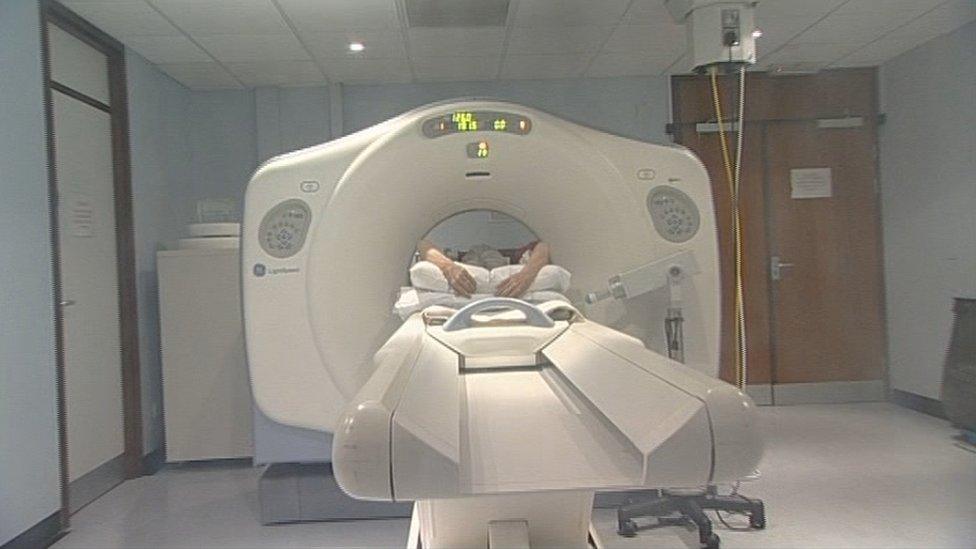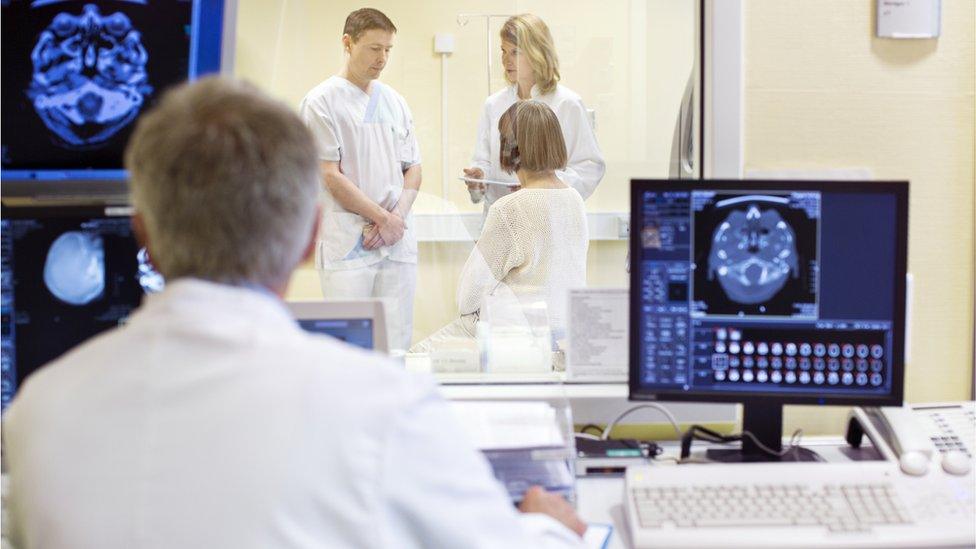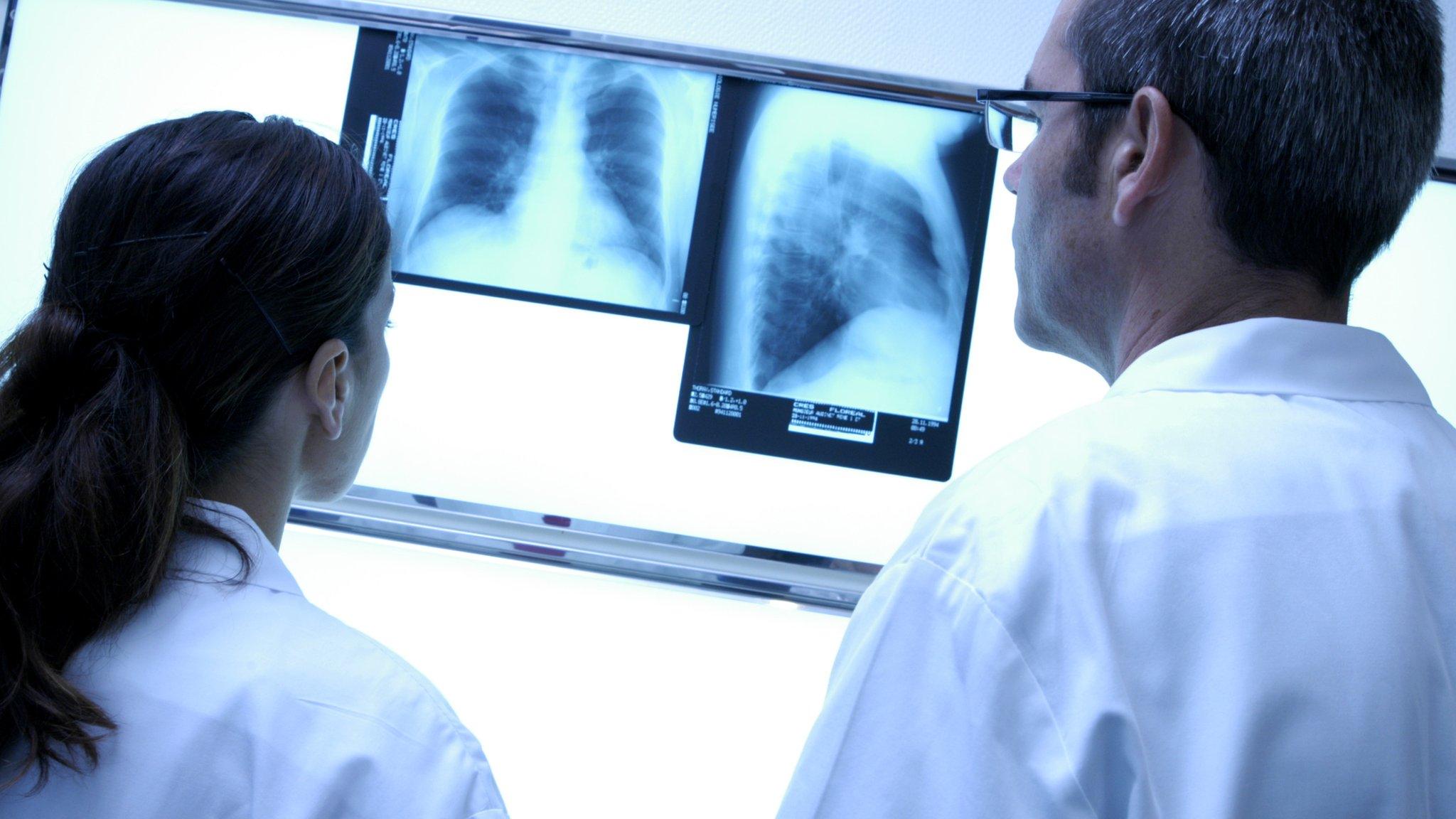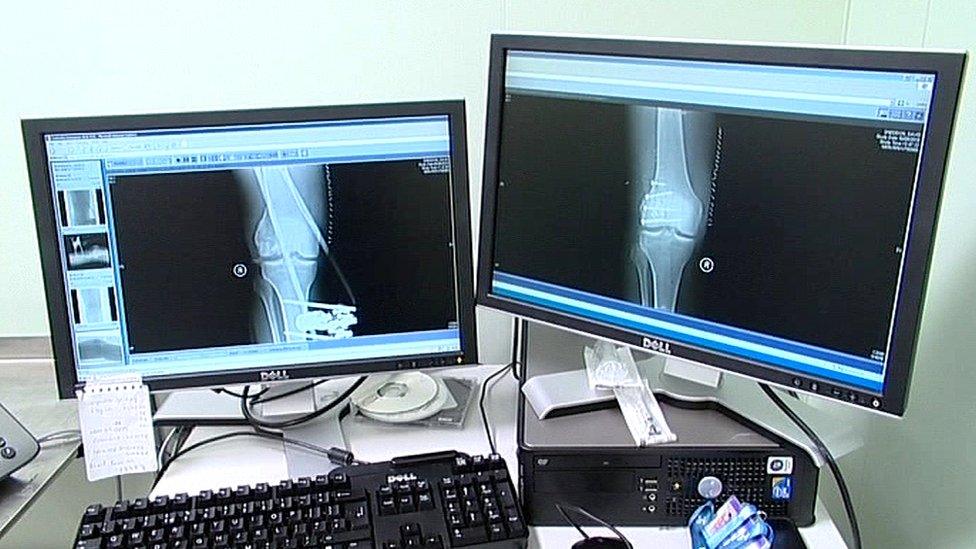Radiologist shortage in Scotland 'red alert' warning
- Published
'There are patients with cancer and no-one knows'
Scotland's radiologists have said the service is on "red alert" because of a shortage of trained doctors.
Dr Grant Baxter, who chairs the Royal College of Radiologists in Scotland, has warned more training places are urgently needed.
Raigmore Hospital in Inverness will this week lose its last interventionist radiologist in a substantive post.
The Scottish government has promised an additional 50 training places over the next five years.
Radiologists play a key role in interpreting X-rays and scans, and in administering a growing range of treatments.
In the case of patients from the Highlands, emergency cover will be provided in Aberdeen or Dundee.
Dr Baxter said: "We are on red alert. There is absolutely no doubt about this.
"If we do not address this issue now, there simply won't be a service in the next three, four, five years.
"We need to start training more radiologists. We need to put in the IT systems.
"The government need to be bolder, listen to what we're saying, and increase the number of trainees. It is the key part of the solution."

The patients who call radiologists their life-savers
Mick Brett, who makes a 120 mile journey to see his radiologist, is worried about the future of the service
Mick Brett has become all too familiar with the 120-mile journey he has to take from his home on the Isle of Eigg to see his radiologist in Inverness.
However, Raigmore Hospital is soon to lose its last interventionist radiologist and the health board has confirmed that in emergencies patients will be transferred to Aberdeen or Dundee.
Mr Brett told the BBC: "Having the radiology department without the consultant is like having a garage without mechanics and everybody turning up to have their cars mended - it can't be done. So, what is going to happen? It's lunacy."
Louise Mackay says the intervention of radiologists in her cancer care has kept her alive
Louise Mackay knows first hand the importance of radiology intervention. She is a mother-of-four with terminal cancer and regularly contracts infections like sepsis. That is a deadly condition which radiologists can treat.
She said: "The radiology department is critical to saving my life - to having me be here with my family. It's terrifying as a patient to think that on the occasion where there will be another infection, I don't know where to go."

The shortage of radiologists is not unique to Scotland.
Last month, the regulator of heath care services in England called for a limit on how long it takes to report the results of patients' X-rays and scans.
The Care Quality Commission's review of radiology practices found that the process could vary from one hour to two working days in hospital A&Es.
This could mean delays in results being shared with doctors and patients receiving timely care.
The review also said there were not enough radiologists to meet demand.
A shortage of trained radiologists has also been reported in Northern Ireland.
The Scottish government said it acknowledged there is a shortfall.
It has, however, filled all of the initial batch of new training places and has been investigating other ways to transform the service.
Deputy chief medical officer Dr Gregor Smith said: "I'm satisfied that the medical directors have considered all the available options to them and have put in place all the necessary interventions that they need to do to ensure patient safety is maintained at all times.
"And that's a wide variety of things, not only looking to see how they can recruit additional consultant staff to make sure that the services is robust in that sense but actually how they can use the additional work force as well, right across the different professionals involved in radiological services to make sure the service is completely safe."
Dr Baxter believes radiology has become so important for diagnosis and treatment that its provision indicates the overall quality of health care.
"You can gauge how good your health services is by your radiology department," he said.
"When radiology does well your health service will do well, when radiology fails as it is currently doing, the health services fail because every patient will come through an imaging radiology department."

What is a radiologist?

Is it just about looking at x-rays?
Radiologists are qualified doctors who specialise in medical imaging. According to the Royal College of Radiologists: "A radiologist is a doctor who is specially trained to interpret diagnostic images such as X-rays, MRI and CT scans.
"If you have an interventional procedure (such as an angiogram or biopsy) a radiologist will perform the procedure. Sometimes ultrasound scans may be performed by a radiologist.
"Radiologists provide a written report of the results of your examination which he or she will send to your doctor."
So, what's the difference between radiologists and radiographers?
Radiographers are healthcare professionals who specialise in imaging or delivering radiotherapy treatments. The Society of Radiographers says there are two types of work that they do:
"Diagnostic radiographers employ a range of techniques to produce high quality images to diagnose an injury or disease...
"Therapeutic radiographers are responsible for the planning and delivery of accurate radiotherapy treatments using a wide range of technical equipment. The accuracy of these are critical to treat the tumour and destroy the diseased tissue, while minimising the amount of exposure to surrounding healthy tissue."

In February, a global campaign to attract radiologists to work in the Scottish NHS was launched.
Nine health boards, including NHS Fife, Grampian and Greater Glasgow and Clyde, reported vacancies which they have struggled to fill.
NHS Scotland took its recruitment drive to India, the US, Canada, western Europe and Australia.
Radiologists working in the health service fear the measures taken so far, while welcome, will not fix the problem.
Dr Baxter said: "In many ways the dominos are beginning to fall. We're at a crisis point. We're at a precipice with one foot stepping off and this has major implications for patient care.
"Ultimately it will end up being a postcode lottery of who is available to get what procedure.
"If you were in Highland and in a road traffic accident and presented with bleeding I would be worried. If you were in Highland and had presented with sepsis, uncontrollable infection, I would be worried."
- Published19 July 2018

- Published12 February 2018

- Published30 March 2017
